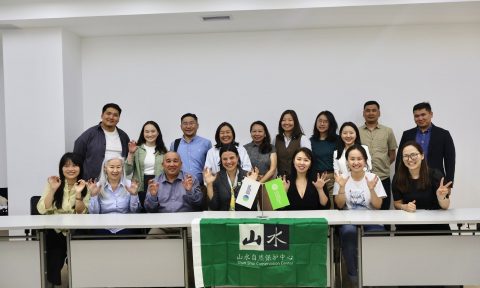Gathering Community Voices: the 2024 seminar on ICCA of Critical Ecosystems in China
The 2024 Seminar on ICCAs of Critical Ecosystems in China (referred to as 2024 China ICCA Seminar) was successfully held in Nanning, Guangxi. The conference was jointly organized by ICCA Consortium Members Guangxi Biodiversity Research and Conservation Association (BRC) and Shan Shui Conservation Center, supported by Zhilan Foundation, Shan Shui Foundation, and Xianfeng Foundation.

Community conserved areas (CCAs) serve as a beneficial complement to the protected area system, playing an irreplaceable role in areas where official protected areas are difficult to cover and in ecologically fragile regions. They have the potential to contribute to achieving the “30X30 Goal” of the GBF. In order to expand the influence of CCAs and explore the challenges they face, as well as their value in biodiversity conservation and sustainable community development, the ICCA China Seminar was held successfully on April 28-29 in Nanning, Guangxi.

83 attendees, with 40 speakers.
At the 2024 China ICCA Seminar, 83 participants from nature reserves, grassroots organizations, local communities, and research units were present. Among them, 40 representatives delivered speeches, shared case studies, participated in roundtable meetings, or contributed to group discussions. Partners from China, as well as Mongolia and India, vividly described the characteristics of CCAs in various regions using their unique languages, sharing insightful perspectives on community conservation.
 Accompanying the participants from different regions were handcrafted items, creative products, eco-friendly foods, and booklets of various CCAs.
Accompanying the participants from different regions were handcrafted items, creative products, eco-friendly foods, and booklets of various CCAs.

BRC President Li Xiaoya welcomed all attendees in her opening remarks and elaborated on the conference theme of “Community Conserved Area Joint Action Promoting Rural Revitalization.”
3 Keynote speeches and 8 case studies
11 speakers deeply engaged in the field of community protected areas shared specialized topics revolving around policy background, academic research, or specific community case studies, showcasing the latest theoretical advancements and practical achievements.
Li Shengzhi (Sichuan Academy of Social Sciences) introduced the exploration of China’s nature protected area adaptive management mechanism. Dalintai (Inner Mongolia University) narrated the development process of rural governance in China. Feng Jie (Shan Shui Conservation Center) presented the latest progress of CCAs in China.

Regarding case studies, Liu Shengyuan (Nonggang National Nature Reserve, Guangxi) shared the experience of establishing two community co-created wetland protected areas with surrounding communities in Nonggang Reserve. He Haiyan (Shan Shui Conservation Center) introduced the low-carbon community pilot project in Liziba Village, Gansu. Sang Jie (Shanjue Environmental Protection Volunteer Team) addressed grassland management in Ganjia grassland through local knowledge. Fu Yunbo (Mengnanshe Sustainable Development Service Center) shared how the Aka Village in Xishuangbanna restored and protected tropical rainforests from a traditional cultural perspective.
 Wang Songlin (Qingdao Marine Ecology Research Association) discussed livelihood development and conservation efforts in small-scale fishing communities. Zhao Hongli (Liguang Village) recounted the story of establishing a village bank to motivate the community conservation. Hijaba Ykhanbai (CCPN and JASIL, Mongolia) presented conservation practices in Mongolian pastoral communities, while Neema Pathak Broome (Kalpavriksh, India) shared ICCA types and local work in India via video.
Wang Songlin (Qingdao Marine Ecology Research Association) discussed livelihood development and conservation efforts in small-scale fishing communities. Zhao Hongli (Liguang Village) recounted the story of establishing a village bank to motivate the community conservation. Hijaba Ykhanbai (CCPN and JASIL, Mongolia) presented conservation practices in Mongolian pastoral communities, while Neema Pathak Broome (Kalpavriksh, India) shared ICCA types and local work in India via video.
 3 roundtable forums
3 roundtable forums
To convey the voices of everyone more directly, 3 roundtable forums focused on real-time communication and Q&A sessions were organized, concentrating on 3 crucial issues for the development of community protected areas: “Livelihood development in CCAs,” “Viewing CCAs from a cultural perspective,” and “Motivation of community residents in community conservation.”

Lastly on the first day of the Seminar, Zhilan Foundation introduced a new initiative of Community Special Fund, which is designed to support local community conservation thorugh small grants.

1 participative discussion, 7 topics
On the morning of the second day, participants summarized and organized 7 topics of interest, dividing into small groups for discussions to provide more opportunities for interaction and exchange among the attendees. Under the guidance of Deng Yi, Chairperson of the Lijiang Health and Environment Research Center, on the morning of the 29th, attendees freely chose topics for group discussions and shared the results of their discussions through representatives.

1 Community visit and 1 eco beach combing experience
On the afternoon of the 29th, 45 attendees continued to visit the coastal village, Xiacun in Beihai City. Representatives talked with the village committee and the “Ecological Clam Harvesting” group, learning about the clam harvesting livelihood and the village’s current development status. Subsequently, during the village tour and ecological clam harvesting experience, everyone had a more direct experience of the village’s natural and cultural landscape.

CCAs within PAs should serve as a robust support for community engagement in protected area development, while CCAs outside PAs have the potential to become OECMs (Other Effective Area-Based Conservation Measures), contributing to global conservation goals. This seminar provided a platform for all attendees to have equal opportunities for communication and presentation, not only collecting and refining a wealth of knowledge and experience related to community protection but also connecting stakeholders, participants, and advocates for CCAs.


